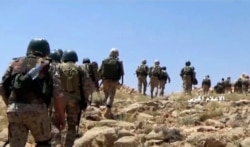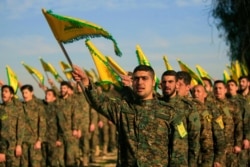The leader of the Lebanese militant group Hezbollah has said that the number of Hezbollah fighters in Syria has decreased.
Hassan Nasrallah said in a recent interview with al-Manar TV, Hezbollah’s official television, that the Syrian regime has been recovering militarily after years of fighting rebel groups seeking to oust Syrian President Bashar al-Assad.
“We are present where we are needed to be,” Nasrallah said, referring to his group’s military presence in war-torn Syria.
The Syrians “have realized that they don’t need us anymore. That’s why we don’t have a real presence on frontlines,” the militant leader said.
Since the outbreak of Syria’s civil war in 2011, Hezbollah has sent thousands of fighters to support the Assad regime.
The Lebanese Shi'ite militant group has been instrumental in major gains made against Syrian rebel forces throughout the country, particularly in Aleppo, Homs and Damascus suburbs.
Backed by Iran, Hezbollah fighters also have a strong presence in parts of oil-rich, eastern province of Deir al-Zour that are under the control of the Syrian regime.
Improved security
Throughout the Syrian war, Hezbollah fighters have been in control of much of Syria’s border with Lebanon. That arrangement has begun to change due to new military dynamics, he said.
Some experts like Seth Frantzman, the executive director of the Middle East Center for Reporting and Analysis, say that Hezbollah forces in Syria are not needed in the same numbers as the country enters a political phase.
“Nasrallah believes Syria is entering a political phase, with less need for boots on the ground, and after seven years of major involvement it makes sense for him to bring the fighters home,” he told VOA.
With Syrian regime troops regaining control of most territory once held by rebel fighters, experts believe that the Syrian government’s dependence on Hezbollah may be limited now.
Nasrallah, however, said that his fighters remain committed to backing Syrian troops for any potential battle in the future.
“A total withdrawal of our forces from Syria is unlikely in the near future. It depends on how the situations unfold in east of the Euphrates and Idlib. The decision is up to the Syrian leadership,” Nasrallah said.
Focus on Israel
In his interview, Hezbollah’s leader said that his group is now capable of striking anywhere in Israel, adding that “in all fields, the resistance has developed in quantity and quality.”
Some experts say that Hezbollah’s redeployment in Syria could be seen as a sign of the group’s “growing confidence and strength, as well as a threat to shift the focus to Israel.”
“In the context of [Nasrallah’s] threats against Israel, including claims that Hezbollah could reach the Galilee in a future war, Hezbollah needs its forces at home to rest up and also provide a kind of ‘lessons learned from Syria’ to future recruits,” analyst Frantzman said.
In response to Nasrallah’s comments, Israeli Prime Minister Benjamin Netanyahu said on Sunday, “If Hezbollah dares to do something stupid and attack Israel, we will strike it and Lebanon, a crushing military strike.”
Since the 2006 Israeli-Hezbollah war, the two sides have occasionally exchanged attacks. In the wake of Syria’s war, Israel has also hit Hezbollah targets inside Syria.
Labeled as a terrorist group by the United States, Hezbollah has been increasingly targeted by U.S. sanctions in recent months. Last week, the U.S. government announced new sanctions on three senior Hezbollah officials for their role in assisting Iran's agenda in Lebanon.






